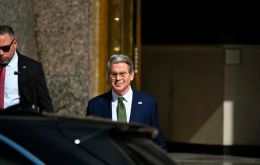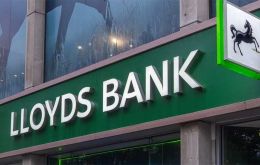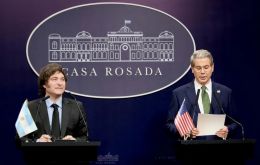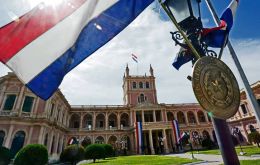MercoPress. South Atlantic News Agency
Economy
-
Thursday, April 17th 2025 - 10:35 UTC
Argentina's Indec to gauge CPI differently

Argentine Cabinet Chief Guillermo Francos announced Wednesday that a new methodology for calculating the Consumer Price Index (CPI) to measure inflation more accurately is to be implemented shortly by the National Institute of Statistics and Census (Indec), pending institutional review and an awareness campaign.
-
Wednesday, April 16th 2025 - 19:13 UTC
Paraguay's GDP projections revised upwards

The Central Bank of Paraguay (BCP) has revised its 2025 GDP growth forecast upward from 3.8% to 4.0%, driven by stronger-than-expected economic activity in early 2025, BCP Chief Economist César Yunis explained. To reach these conclusions, the following issues were taken into consideration:
-
Wednesday, April 16th 2025 - 09:55 UTC
Chinese Embassy in Buenos Aires rebukes Bessent's remarks

The Chinese Embassy in Argentina issued a strong rebuke against US Secretary of the Treasury Scott Bessent for his statements during his visit to Buenos Aires on Monday, accusing him of “maliciously slandering” China by labeling its bilateral swap agreement with Argentina as “rapacious” and debt-heavy.
-
Tuesday, April 15th 2025 - 21:42 UTC
Falklands, new Banking Services Expanded to the Falkland Islands by Lloyds Bank

New personal banking opportunities with a major UK bank are now available for Falkland Islands residents. As part of their Overseas Territories strategy, Lloyds Bank has announced that the Falkland Islands have been added to the list of countries where individuals are able to apply for one of their International Current Accounts and/or Savings Accounts.
-
Tuesday, April 15th 2025 - 19:25 UTC
Paraguay and Uruguay prepare for new scenario with stronger Argentine peso

Following Buenos Aires' announcements regarding the lifting of restrictions to exchange local pesos into US dollars, neighboring Uruguay and Paraguay are preparing for the changes to come. Both countries foresee an increasing influx of Argentine travelers to benefit from the new scenario, which in the case of Paraguay also includes a depreciating guaraní.
-
Tuesday, April 15th 2025 - 10:59 UTC
Milei's Argentina closes ranks with Trump's US

Argentine President Javier Milei met with US Treasury Secretary Scott Bessent at Casa Rosada to discuss strengthening bilateral ties, focusing on a potential trade agreement aligned with US President Donald Trump’s reciprocal tariffs proposal.
-
Monday, April 14th 2025 - 19:11 UTC
Brasil: FGV reports economic stagnation in February

Brazil's economy has been reported to have stagnated in February, with GDP growth at 0% compared to January, according to the Getulio Vargas Foundation's GDP Monitor. While industry and investment showed growth, declines in consumption, agriculture, and exports offset these gains.
-
Monday, April 14th 2025 - 10:18 UTC
CFK posts another “Che Milei” diatribe on X

Former Argentine President Cristina Fernández de Kirchner (CFK) Saturday published on X another issue of her “Che Milei” saga criticizing the incumbent head of State for his arrangements with the International Monetary Fund (IMF) and other credit agencies, foreseeing negative consequences for the country.
-
Monday, April 14th 2025 - 09:59 UTC
Paraguay's economy grows strongly in February

The Estimator of Business Figures (ECN) published by Paraguay's Central Bank (BCP) mentioned a 6% year-to-date sales increase and a 5.2% year-on-year rise compared to February 2024.
-
Monday, April 14th 2025 - 09:55 UTC
Telefónica del Perú leaves the country amid bankruptcy proceedings

Telefónica has sold its Peruvian subsidiary, Telefónica del Perú, to Argentine company Integra Tec International for approximately US$ 992,000, marking its exit from the Andean country after three decades. The sale, part of Telefónica's strategy to reduce Latin American exposure, follows divestments in Argentina and Colombia.
